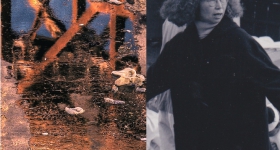The great artists of the past always had rough lives, by choice or
by defect or by happenstance. Choe is no different, and to say he
suffers for his art is something you can take quite literally. Dirty Hands shows
us a man (boy?) constantly struggling between two worlds. Choe both wants and fears
stability. He knows mental and emotional calm can bring him peace, but that same calm will destroy his art. He loves those around him, but
pushes them away. That he wants what he can't have and finds
himself sometimes lonely and without a home, David shows himself to be
relatable not just as a person but especially as an Asian American.
Kim's
style with Dirty Hands is rough and draws upon many years of
footage, mimicking Choe's own rough and threadbare street art. But Kim
as documentarian is also Kim as storyteller, and Dirty Hands,
though seeming to show Choe uncut, ultimately spins Choe in
a sympathetic light. We get the sense that Choe is (somehow) even
darker than the doc lets us believe, and in that sense we feel that
we're still missing out on Choe, at least a little.
Because of Choe's personality and his youth, Dirty Hands seems less like a finished work and more like a check-in with the artist -- the subject resists any kind of story arc or conclusion. Rather, we see that the story will continue and, if Choe
continues along this path as other great artists have, this might not be for much
longer.
This blog entry is graciously sponsored by Toyota Matrix. Check out their website dedicated to the best in Asian American film.












Comments